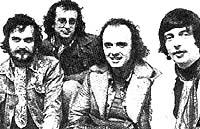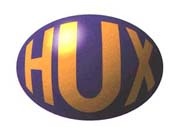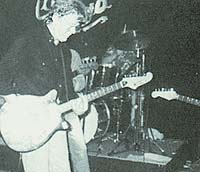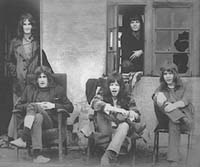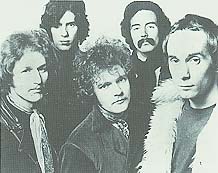|
FOCUS will be remembered as a band that, uniquely, brought instrumental music back into the charts in the early seventies (epitomised by the yodelling epic 'Hocus Pocus' and the glorious 'Sylvia') and - at the time of Britain's entry to the "Common Market" - blazing a trail for European music both in the UK and the States where they enjoyed hit singles and albums. In Thijs van Leer and Jan Akkerman they also had two of rock's finest instrumentalists. On the eve of their sell-out UK tour, in February 1976, Focus' guitarist Jan Akkerman quit the band. This somewhat shocking news came after incessant touring and internal disagreements caused a creative hiatus. This manifest itself in the 1975 album 'Mother Focus' which received mixed reviews. Hugh Fielder writing in 'Melody Maker' thought the band had lost the thrusting side of their nature. Thijs van Leer, the band's founder and longest-surviving member, managed to enrol jazz fusion guitarist Philip Catherine for the tour. By the time of the BBC 'In Concert' recording in March 1976 he was fully up to speed. Although some may miss Akkerman's flamboyance there is no denying that Catherine turned in a competent performance. Focus' days were numbered after this tour. They reconvened for one final album, 'Focus Con Proby' which featured the unlikely presence of sixties pop star PJ Proby. Van Leer continued to pursue a successful solo career (this success had actually contributed to Akkerman's departure) whilst Catherine returned to his jazzier world. David Kemper who had played drums on several of the 'Mother Focus' tracks filled in on the tour and subsequently returned to session work, whilst Bert Ruiter (who had remained with Focus since the 'classic' 1972 line-up) reappeared in his wife's band Earth and Fire.
|
|
MICKEY JUPP
played in several Southend bands after leaving Art College in 1962. It wasn't
until 1968 that, signed to Bell Records, Jupp released 'Legend' playing a
mix of pop and blues rock styles. The original band that recorded this album
split soon afterwards but Jupp subsequently put together a new line-up which
included Bill Fifield on drums (later with T Rex).
A recording deal with Vertigo produced a second album (also called 'Legend') in 1971 and the follow-up 'Moonshine'. In spite of some championing by John Peel, sales were disappointing and the band broke up. Returning to Southend, Jupp pursued a low-key existence until the pub-rock revolution (spearheaded by local bands such as Dr Feelgood) created a fresh interest in rock and roll. He signed to Stiff Records in 1978 and the first compilation covered the first three Legend albums. This was followed by his first solo album 'Juppanese' with production by Nick Lowe and Gary Brooker of Procol Harum. Mickey Jupp went on to produce a further seven solo albums, some appearing on Swedish and German labels. His songs have been recorded by Rick Nelson, The Judds and Chris Farlowe amongst others.
|
|
This Leicester-based group made its
debut in 1968 under the name Legay. Having completed only one single, John
Knapp (vocals/guitar/keyboards), Robin Pizer (guitar/vocals), Rod Read
(guitar/vocals), David McCarthy (bass/vocals) and Moth Smith (drums), took
a new name, GYPSY, and were one of the attractions
featured at the 1969 Isle Of Wight festival.
Their debut album showed great promise and showcased an engaging, tight-harmony style reminiscent of Moby Grape and Buffalo Springfield. Ray Martinez then replaced Rod Read, but the group's second album 'Brenda And The Rattlesnake' lacked the purpose of its predecessor. In spite of laying down tracks for a third album in 1973, the band's label United Artists decided to pass on the option and it remained in the can.
|
|
FAMILY were one of Britain's leading progressive rock bands of the late '60s and early '70s. They were led by the wiry and vocally volatile Roger Chapman (b. 8 April 1942, Leicester, England), a man whose stage presence could both transfix and terrify his audience, who would duck from the countless supply of tambourines he would destroy and hurl into the crowd. Chapman was ably supported by Rick Grech (bass), Charlie Whitney (guitar) Rob Townsend (drums) and Jim King (flute/saxophone). The band was formed in 1962 and known variously as the Roaring Sixties and the Farinas, finally coming together as Family in 1967 with the arrival of Chapman and Townsend. Their first album released in 1968 was given extensive exposure on John Peel's influential BBC radio programme. Following the release of their most successful album 'Family Entertainment' they experienced an ever changing personnel when Rick Grech departed to join Blind Faith in 1969, being replaced by John Weider, who in turn was followed by John Wetton in 1971, then Jim Cregan in 1972. Poli Palmer superceded Jim King in 1969 who was ultimately replaced by Tony Ashton in 1972. Throughout these changes they maintained a high standard of recorded work and had singles success with "No Mules Fool," "Strange Band," "In My Own Time" and "Burlesque." Family disintegrated after their disappointing swan-song album 'It's Only A Movie', Chapman and Whitney departing to form Streetwalkers.
|
|
